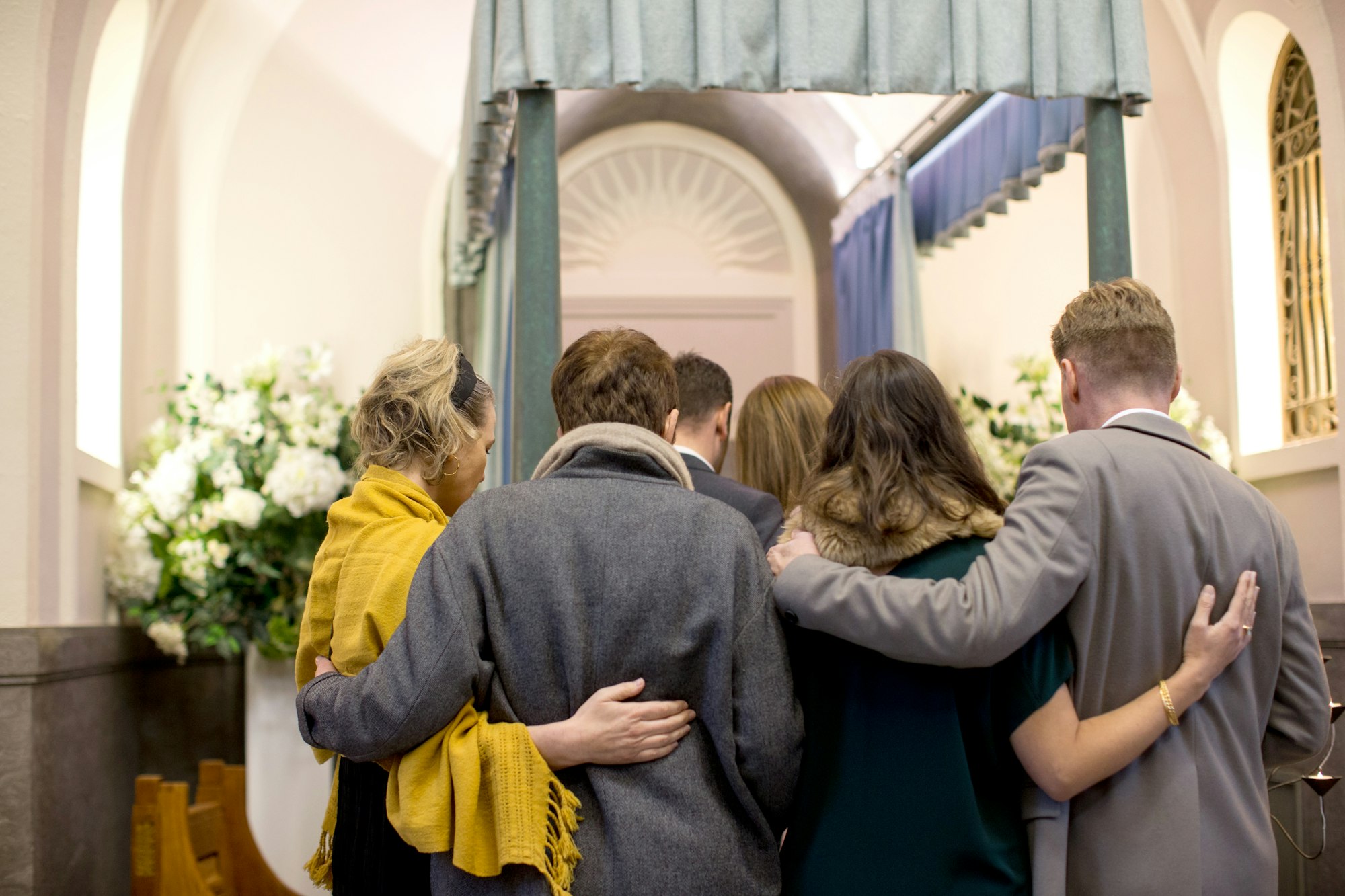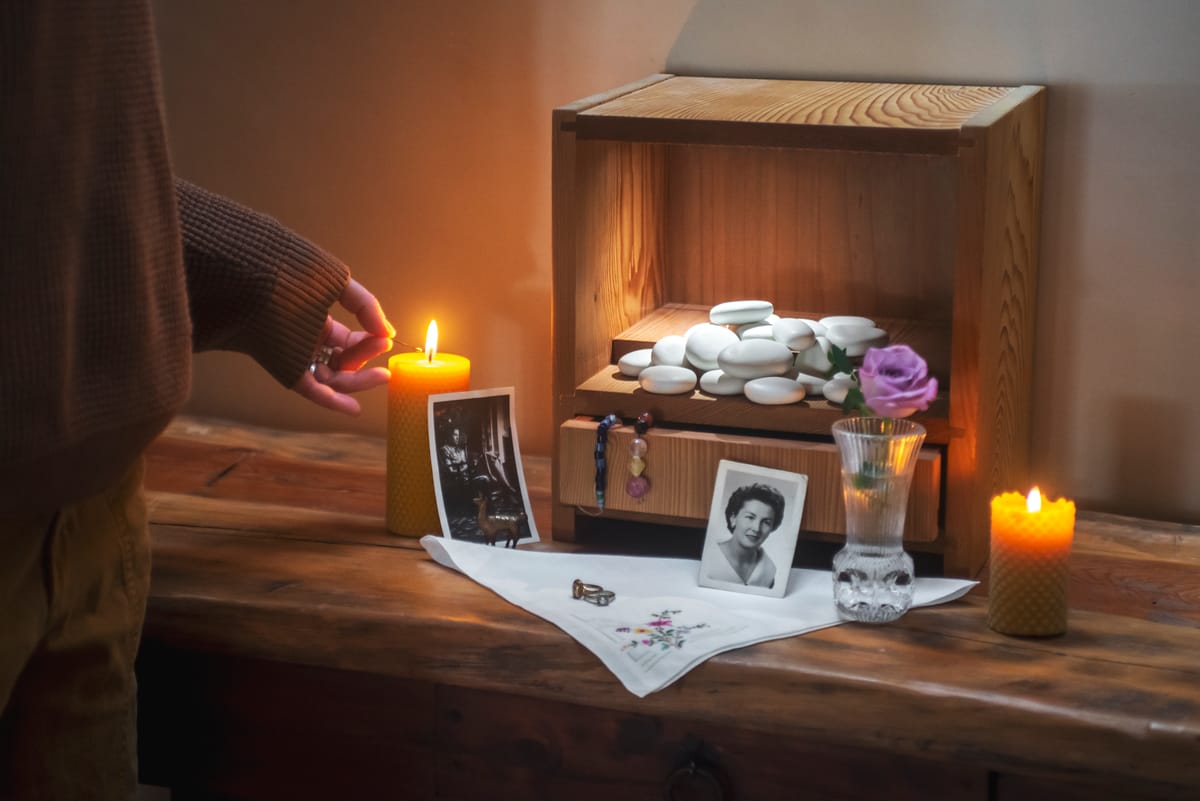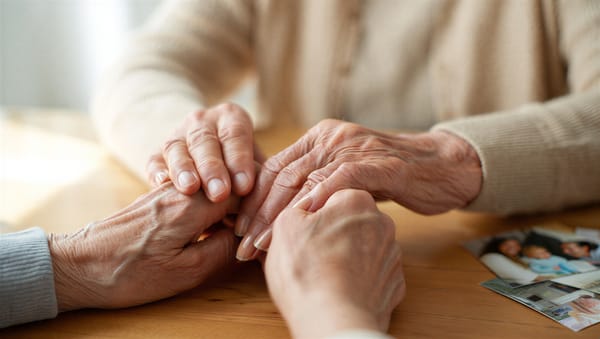What to Expect in Early Grief: The First 6 Months After Loss
Validating, research-backed guidance on the physical, emotional, and cognitive experiences of early grief. You're not losing your mind; grief is simply doing what it's designed to do.

If someone close to you died recently, you might be wondering if what you're feeling is normal. The short answer is: almost certainly yes. The longer answer is that early grief, especially during the first six months after loss, can feel so overwhelming and strange that many people question their own sanity. You're not losing your mind. Your mind and body are doing exactly what they're designed to do when confronted with devastating loss.
During this time, you might feel numb one moment and flooded with emotion the next. You might forget why you walked into a room or struggle to complete tasks that once felt automatic. You might question whether the person you lost actually died, even though you intellectually know they're gone. All of this falls within the wide spectrum of normal grief reactions.
This article explores what many people experience during the acute phase of grief, the first six months when loss feels most raw and disorienting. Understanding what's happening in your body, mind, and emotional landscape during this time won't make the pain disappear, but it can offer validation that your reactions aren't unusual or wrong. Grief doesn't follow a predictable path, but knowing what others have experienced can help you feel less alone in the process.
Key Takeaways
- Early grief (0-6 months) is characterized by intense shock, disbelief, and emotional disorientation that can make even basic daily functioning feel impossible.
- Physical symptoms including exhaustion, sleep disruption, appetite changes, and heightened stress hormone levels are normal grief responses, not signs of weakness.
- Your brain and body are working hard to process an incomprehensible reality; "brain fog," memory issues, and difficulty concentrating are expected during this period.
- There is no universal timeline for grief; what you're experiencing is uniquely yours and cannot be compared to anyone else's process.
- Seeking professional support early is a sign of wisdom, not failure, particularly if grief interferes with basic functioning for extended periods.
Reflections on love, loss, and the ways we carry them
The first six months after losing someone you love can feel like walking through heavy fog. Every step uncertain, and unreal. This period, known as acute grief, is when the heart and mind wrestle with an impossible truth: that someone who shaped your daily rhythm is suddenly gone. The yearning, disbelief, and exhaustion aren’t signs of weakness, they are your body and soul adjusting to a new, unwanted reality.
One of my clients, Therese, described those early months after her husband’s sudden passing as “a blur of sleepless nights and unanswered questions.” She told me, “I’d reach for my phone every morning to text him, and then remember.” Over time, she found solace in creating small rituals. Morning walks where she whispered her prayers, and a weekly dinner where she set a place for him. These acts became anchors in her storm of grief, quiet reminders that love can outlast absence.
Research tells us that grief doesn’t move in straight lines; it comes in waves. Sometimes calm, sometimes fierce. Each wave teaches us how to stay afloat a little longer. The exhaustion, the brain fog, even the moments of numbness are all part of the body’s way of protecting itself.
If you’re in this early season of loss, remember this: you are not broken, you are adjusting. Let your body rest. Let your tears come. And when the fog begins to lift, even for a moment, trust that it’s love, and not forgetting that’s helping you find your footing again.
Cathy Sanchez Babao
Parting Stone Grief Coach
Understanding Acute Grief in the First Six Months
What Should You Expect in the First 6 Months of Grief?
The first six months after losing someone close are typically characterized by what grief researchers call acute grief. Research from the Center for Prolonged Grief at Columbia University indicates that acute grief involves intense feelings of yearning, longing, and sorrow, along with persistent thoughts and memories of the person who died (Shear et al., 2011). During this period, you might experience:
- Waves of intense emotions that feel overwhelming and unpredictable
- Physical symptoms including exhaustion, sleep disturbances, and appetite changes
- Difficulty concentrating or making decisions, even about simple matters
- A sense of unreality or disbelief about the death
- Intense longing for the person who died, even when you intellectually accept they're gone
- Periods of numbness alternating with emotional intensity
According to research published by the American Psychiatric Association, these reactions occur as your mind gradually processes the reality of permanent separation from someone who held significance in your life (American Psychiatric Association, 2022). This isn't a linear process with distinct stages. Rather, grief tends to come in waves, with periods of relative calm interrupted by surges of intense emotion that can feel as fresh as the day of the loss.
Why Early Grief Feels Different from Other Difficult Experiences
Many people describe early grief as unlike any other painful experience they've encountered. There's a reason for this. When someone significant in your life dies, your brain must reconcile two competing realities: the person is permanently gone, yet your attachment system, built over years or decades, still expects them to be present. This creates what researchers describe as a fundamental disruption to your sense of how the world works.
The Mayo Clinic notes that during early grief, many people experience numbness as their initial reaction (Mayo Clinic, 2022). As this numbness wears off over days or weeks, more intense and painful feelings of loss typically emerge. This isn't a sign that you're getting worse; it's evidence that your mind is beginning to process what happened.
Sarah from Moriah, New York 🖤, who lost her husband, describes this experience: "I was having difficulty deciding on an urn. Parting stones also made it easier to share my husband's remains with our large, close-knit family. He was an avid rock collector as well, so everything about this made sense and has given me peace."
Meet Justin Crowe, founder of Parting Stone. After his grandfather passed away in 2014, Justin noticed something many families experience: the discomfort of living with cremated remains stored in closets, garages, or basements. That personal loss inspired him to create something different. Working with material scientists at Los Alamos National Laboratory, Justin developed a way to transform 100% of cremated remains into smooth, touchable stones that families can hold, share, and carry with them. Today, Parting Stone has served over 13,000 families who were ready for an alternative to traditional ashes.
The Variable Nature of Grief Timelines
One of the most important things to understand about early grief is that there is no "right" timeline. The Canadian Psychological Association reports that about 30% of bereaved individuals experience relatively mild distress and adapt quickly, while another 30% experience waves of high distress, and the remaining 40% fall somewhere in between (Canadian Psychological Association, 2024). This means your grief experience cannot be compared meaningfully to anyone else's.
Some factors that can influence how grief unfolds include the circumstances of the death, the nature of your relationship with the person who died, your previous experience with loss, your current support system, and whether you have a history of anxiety or depression. None of these factors determines whether you're "doing grief right." They simply help explain why grief looks different for different people.



Physical Manifestations of Early Grief
How Your Body Responds to Loss
Grief isn't just an emotional experience; it's a full-body event. Understanding the physical dimension of grief can help you recognize that what you're experiencing is a normal response to profound loss, not a sign of physical illness or personal weakness.
Research published in the journal Circulation found that the risk of heart attack increases significantly in the first day after losing someone close, with elevated risk continuing through the first month (Circulation, 2012). While this sounds alarming, it reflects the intense physical stress your body experiences during acute grief. Your body releases elevated levels of cortisol, the stress hormone, which can remain elevated for up to six months after loss (WebMD, 2023).
Sleep Disruption and Exhaustion
One of the most common physical symptoms during early grief is profound disruption to sleep patterns. You might find yourself unable to fall asleep as your mind races with memories, regrets, or questions. Or you might fall asleep easily but wake frequently throughout the night. Some people experience the opposite problem: sleeping far more than usual as their body seeks escape from emotional pain.
The Mayo Clinic identifies insomnia and nightmares as among the most common physical symptoms of grief (Mayo Clinic Health Letter, 2014). This sleep disruption then creates a cascade of other problems. When you're sleep-deprived, your immune system weakens, making you more vulnerable to colds and other illnesses. Your cognitive function declines further, compounding the mental fog that grief already creates.
Good sleep hygiene can help somewhat: going to bed and waking at consistent times, creating a calm bedtime routine, avoiding screens before sleep. But it's also important to have realistic expectations. During the first few months after loss, your sleep will likely be disrupted regardless of what you do. This is your body's way of processing trauma, not a personal failing.
@ohthatjenny If you would like more information on Parting Stone and the process please dont hesitate to ask. I feel so confident that Chris would love this way of keeping his memory alive. He is SO missed and loved still and always. #partingstone #partingstones #lifeafterloss #griefandloss @PartingStone
♬ original sound - Jenny
Changes in Appetite and Eating Patterns
Grief profoundly affects your relationship with food. Some people lose their appetite entirely and must force themselves to eat even small amounts. Others find themselves eating compulsively, seeking comfort in food or simply eating mechanically without tasting anything. Both responses are common during acute grief.
The physical symptoms extend beyond just appetite changes. According to WebMD, stress hormones released during grief can cause nausea, stomach cramps, diarrhea, constipation, and can even contribute to conditions like irritable bowel syndrome (WebMD, 2023). The phrase "gut-wrenching grief" isn't merely metaphorical; your digestive system is profoundly affected by the stress of loss.
If you're struggling to eat regular meals, try setting reminders to eat small amounts throughout the day. Nutritious smoothies or protein drinks can provide calories when solid food feels impossible. Asking friends to bring simple, easy-to-digest foods can help. The goal during this period isn't perfect nutrition; it's simply maintaining enough nourishment to support your body through this intensely stressful time.
Physical Pain and Stress Responses
Many bereaved people experience physical pain during early grief. Chest tightness, headaches, muscle tension, and a heavy feeling throughout the body are all commonly reported. Some describe feeling like they're moving through water or mud; everything requires more effort than it should.
The phrase "broken heart syndrome" refers to a real medical condition, stress-induced cardiomyopathy, where the heart temporarily enlarges and doesn't pump effectively following intense emotional stress (Mayo Clinic, 2023). While this condition is relatively rare and treatable, it illustrates how profoundly grief affects the physical body.
Lynn from Houston, Texas 🖤 describes the physical dimension of her grief: "I have been able to quietly and privately place stones in places that were meaningful to us through our 53 years together, share them with family and the closest of friends, and keep a few close to favorite photographs. They are a beautiful and comforting presence."
If you're in crisis or having thoughts of harming yourself, please reach out immediately. Help is available 24/7:
National Suicide Prevention Lifeline
Call or text: 988
Available 24/7 for anyone in emotional distress or suicidal crisis
Website: https://988lifeline.org
Crisis Text Line
Text "HELLO" to 741741
Free, 24/7 crisis support via text message
Website: https://www.crisistextline.org
SAMHSA National Helpline (Substance Abuse and Mental Health Services Administration)
Call: 1-800-662-4357 (1-800-662-HELP)
Free, confidential, 24/7 treatment referral and information service
Website: https://www.samhsa.gov/find-help/national-helpline
The Compassionate Friends (for those who have lost a child)
Call: 877-969-0010 Support for families after the death of a child
Website: https://www.compassionatefriends.org
TAPS (Tragedy Assistance Program for Survivors - military loss)
Call: 800-959-8277
24/7 support for those grieving the death of a military loved one
Website: https://www.taps.org
National Alliance on Mental Illness (NAMI) Helpline
Call: 1-800-950-6264 Text "HELPLINE" to 62640 Monday through Friday, 10 a.m. to 10 p.m. ET
Website: https://www.nami.org/help
International Association for Suicide Prevention (for resources outside the US)
Website: https://www.iasp.info/resources/Crisis_Centres/
You are not alone. Reaching out for help is a sign of strength, not weakness. These organizations have trained counselors who understand grief and can provide immediate support.
When Physical Symptoms Require Medical Attention
While most physical symptoms of grief are normal responses to stress, some warrant medical evaluation. If you experience chest pain, especially accompanied by shortness of breath, dizziness, or cold sweats, seek medical care immediately. These could indicate a heart problem requiring treatment.
Similarly, if you're unable to eat or drink for extended periods, experience severe weight loss, or notice symptoms of dehydration, consult a healthcare provider. It's also worth mentioning to your doctor that you're grieving; this context helps them understand symptoms that might otherwise seem puzzling and can lead to appropriate support and resources.

Emotional and Cognitive Experiences in Early Grief
The Fog of Early Grief: Cognitive Impacts
One of the most disorienting aspects of early grief is how it affects your ability to think clearly. Many people describe this as "grief brain" or "widow's fog." You might forget appointments, lose track of conversations mid-sentence, or struggle to complete basic tasks that once felt automatic. This isn't early dementia or permanent cognitive decline; it's your brain operating under extreme stress.
Research published in the PMC Journal examining cognitive predictors of grief found that memory problems, difficulty concentrating, and impaired executive function are common during the first six months after loss (PMC, 2019). Your brain is expending enormous energy processing the reality of permanent separation from someone important. This leaves fewer cognitive resources available for routine tasks.
Columbia University's Center for Prolonged Grief explains that during acute grief, thoughts of the person who died dominate mental space, making it difficult to concentrate on anything else (Shear, M.K., 2024). This preoccupation isn't voluntary; it's part of how your mind attempts to integrate the loss into your understanding of reality.
Decision-Making Challenges
Early grief is not the time to make major life decisions if you can possibly avoid it. Your judgment is impaired not because you lack intelligence or wisdom, but because your cognitive capacity is severely compromised by grief. Decisions about selling your home, changing jobs, or making major financial commitments should ideally be postponed until you're further along in the grief process.
If you must make important decisions during this time, seek input from trusted friends or family members, consult professionals when appropriate, and give yourself permission to move slowly. The conventional wisdom of waiting at least a year before making major life changes after loss exists for good reason.

A New Way to Hold Close What Matters Most
We transform cremated remains into beautiful, touchable stones that bring comfort when you need it. Something you can hold, share, and keep close.
The Emotional Landscape: Numbness, Flooding, and Everything Between
Grief brings an unpredictable emotional landscape. You might feel numb and disconnected one moment, then flooded with overwhelming sadness, anger, or fear the next. This emotional volatility isn't a sign of instability; it's a normal response to processing loss.
The initial numbness many people experience serves a protective function. According to the Mayo Clinic, this emotional cushioning gives you time to begin absorbing the reality of loss without becoming completely overwhelmed (Mayo Clinic, 2022). As the numbness gradually lifts, you typically experience more intense emotions.
The Spectrum of Grief Emotions
While sadness is the emotion most commonly associated with grief, the emotional experience is far more complex. The American Psychiatric Association notes that grief commonly involves anxiety, anger, remorse, guilt, and shame alongside sadness (APA, 2022). You might feel:
- Anger at the person who died for leaving you
- Rage at the universe, at God, or at the unfairness of death
- Guilt about things said or unsaid, done or left undone
- Relief, particularly if death followed a long illness (which can then trigger guilt about feeling relieved)
- Anxiety about your own mortality or the safety of other loved ones
- Loneliness so profound it feels like physical pain
- Momentary joy or laughter, followed by guilt for experiencing positive emotions
All of these emotions, even the seemingly contradictory ones, fall within normal grief. You don't have to justify or explain your emotional reactions, even to yourself.
Valencia from Clinton, Michigan 🖤 shares her experience: "I carry one of his rocks with me in my purse. I slept with a few for a while too. I love them! Rocks are neither created nor destroyed, but re-distributed and transformed from one rock type to another. This fun fact resonated with me about life and death. He's still with me, just in a different form."
Grief Waves and Triggers
Understanding grief waves can help you navigate early grief with more self-compassion. Grief doesn't diminish in a steady, linear fashion. Instead, it comes in waves of varying intensity. You might have several days of relative calm, then suddenly be overwhelmed by grief so intense it takes your breath away.
These waves can be triggered by obvious reminders like holidays, anniversaries, or places you visited together. But they can also be triggered by seemingly random things: a particular scent, a phrase someone uses, a song on the radio. Cleveland Clinic research indicates that grief waves are evidence of love, not signs that you're not healing (Cleveland Clinic, 2023). The waves typically become less frequent and less intense over time, but they may never completely disappear.

Social and Relational Changes During Early Grief
How Grief Affects Your Relationships with Others
Loss doesn't occur in isolation; it reverberates through all your relationships. During early grief, you might find that some relationships deepen while others become strained or fall away entirely. This reorganization of your social world is common and often painful.
Some people will surprise you with their capacity to sit with your pain without trying to fix it or rush you through it. Others, particularly those uncomfortable with death or strong emotions, might withdraw or offer unhelpful platitudes. This isn't necessarily a reflection of how much they care; many people simply don't know how to support someone in acute grief.
The Loneliness of Grief
Even when surrounded by supportive people, grief can feel profoundly lonely. No one else experienced the specific relationship you had with the person who died. No one else will grieve this particular loss in exactly the way you do. This fundamental aloneness is one of grief's most difficult aspects.
The Center for Prolonged Grief at Columbia University notes that intense loneliness and a sense of being alone or detached from others are common symptoms of acute grief (Shear, M.K., 2024). You might feel like you're going through the motions of social interaction without truly connecting. The world continues around you while you feel frozen in place.
Navigating Others' Expectations and Judgments
One of the most challenging aspects of grief involves managing others' expectations about how you should grieve and how quickly you should "get better." Comments like "you should be feeling better by now" or "it's time to get back to normal" reflect other people's discomfort with grief, not actual timelines for healing.
Research consistently shows that acute grief typically lasts well beyond the few weeks or months that many people expect. The National Institutes of Health indicates that while most people begin adapting to loss within 6-12 months, this doesn't mean they're "over" the loss or that grief has ended (NIH, 2025). Rather, grief has been integrated enough that daily functioning improves.
You don't owe anyone an explanation for your grief timeline. If people pressure you to "move forward" or suggest that you're dwelling on loss, remember that they're uncomfortable with your grief, not that you're grieving incorrectly.
The Complicated Question of Social Support
During early grief, you need support. But accepting support can feel complicated. You might not know what kind of help you need. You might feel guilty asking for assistance. You might lack energy to explain your needs repeatedly to different people.
One practical approach is to identify one or two people who can serve as coordinators, communicating with others about specific ways to help. This could include meal coordination, help with childcare, assistance with paperwork, or simply someone to check in regularly. Specific requests ("Could you bring dinner on Tuesday?" or "Would you help me sort through bills?") are easier for people to respond to than vague offers of "let me know if you need anything."
Mary from Prescott, Arizona 🖤 describes how she found support: "Friends and family joyfully accept and even request parting stones - some to keep, some to leave at places memorable to them and our departed loved one. As a widow, I found Parting Stones to be a valuable and comforting way to grieve, to remember shared experiences and to invite my late husband along on new adventures. I've shared the stones with members of a local widow's group, and several have embraced the product as well. We all carry stones with us, wherever we go, as a constant reminder of the good times and the love."

Practical Challenges and Daily Functioning
The Weight of Basic Tasks
During early grief, tasks that once required no conscious thought can feel monumentally difficult. Making dinner, showering, responding to emails, paying bills - everything requires more energy than you have available. This isn't laziness or weakness; it's your brain and body operating under extreme stress with severely depleted resources.
The Cleveland Clinic notes that acute grief can make basic daily functioning challenging, with people struggling to complete routine tasks at work and home (Cleveland Clinic, 2023). Be gentle with yourself about what you can accomplish during this time. Lowering your standards isn't giving up; it's realistic assessment of your current capacity.
Strategies for Managing Daily Life
While there's no way to make daily tasks feel easy during early grief, some strategies can help you manage:
- Simplify ruthlessly. Eliminate everything that isn't essential. Paper plates are fine. Takeout is fine. A messy house is fine. This is survival mode, not normal life.
- Create routines. When decision-making feels impossible, having established routines reduces cognitive load. Eating the same simple breakfast every day means one less decision to make.
- Accept help. If people offer specific assistance, say yes. Someone doing your grocery shopping or folding your laundry isn't diminishing your strength; it's allowing you to conserve limited energy for processing grief.
- Lower expectations. If your normal standard is 100%, aim for 30% during early grief. That might be all you have available, and 30% is enough.
Navigating Work and Professional Obligations
Returning to work after loss presents unique challenges. Some people find that work provides welcome structure and distraction. Others struggle to concentrate and perform basic job functions. Both responses are normal.
The challenge is that most workplaces don't provide adequate bereavement leave. A few days or weeks rarely suffices for early grief. If possible, discuss flexible arrangements with your employer: reduced hours, the option to work from home, or modified responsibilities during the first few months. Not all employers will accommodate these requests, but it's worth asking.
If you must return to work while still in acute grief, consider informing trusted colleagues about your situation. This context can help explain memory lapses, emotional moments, or decreased productivity. You're not obligated to share personal details, but simply noting "I'm dealing with a significant loss and might not be at my best" can create space for grace.
Financial and Legal Matters
Early grief often coincides with urgent practical matters: death certificates, insurance claims, estate administration, and countless other details. These tasks require clear thinking and sustained attention, precisely what grief makes most difficult.
If possible, enlist help from a trusted friend, family member, or professional (attorney, financial advisor, or estate administrator) to manage these matters. Having someone review documents, make phone calls, or simply sit with you while you work through paperwork can make impossible tasks manageable.
Be aware that grief significantly impairs judgment about financial decisions. Scammers sometimes target bereaved people, and well-meaning individuals might suggest investments or purchases that aren't in your best interest. Move slowly with financial decisions, consult multiple sources, and when possible, postpone major decisions until you're past the most acute phase of grief.
Understanding Memorial Decisions in Early Grief
The Question of What to Do with Remains
If your loved one was cremated, you might feel pressure, either internal or external, to decide what to do with their ashes. This pressure can feel overwhelming during early grief when even small decisions feel impossible.
Here's an important truth: you don't have to decide immediately. Cremated remains can wait safely while you process your grief and determine what feels right for you and your family. There's no deadline for making memorial decisions.
Many families discover that their feelings about memorial options change as grief evolves. What feels impossible to consider at two months might feel meaningful at eight months or two years. Giving yourself permission to postpone decisions removes one source of pressure during an already overwhelming time.

Preserving Options for Future Memorial Decisions
Some families find comfort in knowing that memorial options remain open. Parting Stone offers families the option to transform cremated remains into solidified remains through an 8-10 week process, creating a tangible way to honor someone's memory when families feel ready to make that choice.
At $2,495 for human remains solidification, families can choose this option when it aligns with their emotional readiness rather than feeling pressured by external timelines. The solidification process preserves the full weight and integrity of cremated remains while creating individual stones that families can keep, share, or place in meaningful locations.
This approach recognizes a fundamental truth about grief: decisions made when you're ready carry different emotional weight than decisions made under pressure or during acute grief. Whether you're considering solidified remains, traditional burial, scattering, or simply keeping ashes in their current container, the decision is yours to make on your own timeline.
Jean from Ashburn, Virginia 🖤 shares her perspective: "My parents passed away in 2021 so I've just initiated the Parting Stone process in 2025. I feel it will be a much better tribute to them to incorporate the stones in the garden or anywhere else that was meaningful to them. I didn't live in the same country where they passed so this is a way to keep them close. I was looking for a way to keep my parents close. They were cremated in another country because that is the standard practice due to burial limitations where they were. I liked the concept of keeping them close and incorporating them into the garden or water feature."
When Professional Support Becomes Important
Distinguishing Normal Grief from Complicated Grief
Most people experience intense acute grief during the first six months after loss, and this gradually becomes integrated over time without professional intervention. However, some people develop what's called prolonged grief disorder, where acute grief symptoms remain intense and disabling beyond 12 months for adults or 6 months for children and adolescents.
The Center for Prolonged Grief at Columbia University describes prolonged grief as feeling "stuck" in acute grief as if the death just happened, even years later (Shear, M.K., 2024). This affects approximately 10-20% of bereaved people, with rates varying depending on circumstances of the death.
Signs That Professional Support Would Be Helpful
Seeking professional support isn't a sign of weakness or failure. It's appropriate to consider grief counseling or therapy if:
- You're having persistent thoughts of self-harm or suicide
- You're unable to perform basic self-care (eating, sleeping, hygiene) for extended periods
- Grief symptoms intensify rather than gradually lessening over several months
- You're using alcohol or drugs to cope with grief
- You're experiencing panic attacks or severe anxiety that interferes with daily life
- You feel completely isolated with no support system
- You're struggling with complicated circumstances like traumatic death, suicide, homicide, or losing a child
According to the Mayo Clinic, seeking bereavement counseling early, during the first months after loss, can help you explore emotions and learn healthy coping skills (Mayo Clinic, 2022). This early support can prevent negative thoughts and beliefs from becoming so entrenched that they're difficult to overcome later.
Types of Professional Support Available
Several types of professional support can help during early grief:
- Grief counseling focuses specifically on navigating bereavement and typically involves shorter-term support. Grief counselors help you process emotions, develop coping strategies, and work through practical challenges of loss.
- Therapy addresses both grief and related mental health concerns like depression, anxiety, or trauma. This might be particularly relevant if grief has triggered or worsened existing mental health conditions.
- Support groups bring together people experiencing similar losses. Hearing from others who understand the specific challenges of your type of loss can reduce isolation and provide practical coping strategies. Many hospice organizations offer free bereavement support groups.
- Complicated Grief Treatment (CGT) is a specific evidence-based approach developed at Columbia University for people experiencing prolonged grief. This 16-session treatment has shown 70% response rates in clinical trials (Center for Prolonged Grief, 2016).
Self-Compassion and Realistic Expectations
Giving Yourself Permission to Grieve
One of the most important things you can do during early grief is extend compassion to yourself. This means acknowledging that grief is hard work, that you're doing the best you can under extraordinarily difficult circumstances, and that there's no "right" way to grieve.
Self-compassion in grief includes:
- Releasing comparison. Your grief is uniquely yours. It won't look like anyone else's grief, and that's exactly as it should be. Comparing your grief process to others' is neither helpful nor possible; you're grieving a relationship and a person that no one else experienced in exactly the way you did.
- Accepting your current capacity. Whatever you're capable of accomplishing right now is enough. If all you can manage today is getting out of bed and eating one meal, that's a success, not a failure.
- Allowing contradictory emotions. You can miss someone intensely while also feeling relieved that their suffering ended. You can be devastated by loss while also experiencing moments of joy. Grief isn't one emotion; it's a complex constellation of feelings that often contradict each other.
- Recognizing that grief isn't linear. You won't feel progressively better each day or week. Some days will feel harder than days weeks earlier. This isn't backsliding; it's the natural ebb and flow of grief.
What Recovery Doesn't Mean
There's often confusion about what it means to "recover" from grief or adapt to loss. Recovery doesn't mean:
- Forgetting the person who died
- No longer feeling sad about their death
- Returning to exactly who you were before the loss
- Having no difficult days related to grief
- Being "over it" or having "moved on"
Instead, adaptation to loss means that grief, while permanent, becomes integrated into your life in a way that allows you to function, find meaning, and experience joy again. The loss becomes part of your story, shaping you but no longer dominating every aspect of daily existence.
Research from Columbia University describes this as moving from acute grief to integrated grief, where you remember and honor your loved one without it disrupting your own life (Shear, M.K., 2011). This process typically unfolds gradually over months or years, not weeks.
Linda from Albuquerque, New Mexico 🖤 describes how this integration feels: "When I feel overwhelmed with emotions, I reach for a stone and know that I have the heart of my loved one to keep me strong. As silly as it sounds, you can carry your loved one in your pocket. When you have emotions, reach for the stone and hold it to your heart. And remember the good times. You will feel that push to get you through the hard times."

Moving Forward While Carrying Grief
The Reality of Permanent Change
Loss changes you permanently. The person you were before this death no longer exists, and trying to return to that previous self is neither possible nor necessary. Grief reshapes your understanding of yourself, your relationships, and your place in the world.
This permanent change isn't only negative. Over time, many people report that profound loss has deepened their capacity for empathy, clarified their priorities, and strengthened their most important relationships. This doesn't minimize the pain or make loss worthwhile. Rather, it acknowledges that humans have remarkable capacity to grow alongside grief, to carry loss while also moving forward into life.
Building a Life That Includes Grief
As you move beyond the initial six months after loss, the work of grief shifts somewhat. Early grief focuses primarily on survival: getting through each day, processing the shock and initial emotional intensity. As time passes, the work becomes more about integration: how to build a meaningful life that includes both the permanence of loss and the possibility of joy, connection, and purpose.
This doesn't happen according to any set timeline. Some people begin this integration earlier, others much later. Both paths are valid. What matters is honoring your own pace and recognizing that carrying grief doesn't preclude living fully.
The National Institutes of Health notes that while intense grief symptoms typically lessen over time, grief itself is permanent after losing someone you love (NIH, 2025). The way grief shows up in your life changes, becoming less disruptive while remaining present. This permanent presence isn't pathology; it's evidence of meaningful connection.
Honoring Connection While Embracing Life
Finding ways to maintain connection with the person who died while also engaging with life is one of grief's central challenges. These don't have to be mutually exclusive. You can honor someone's memory through rituals, storytelling, charity work in their name, or simply carrying them in your heart while also pursuing new experiences, relationships, and sources of meaning.
Robert from Franklin, Tennessee 🖤 describes this balance: "When we were trying to decide what to do with our son's ashes, we only knew that we wanted to spread them somewhere. Unfortunately, we were unable to pick one place to spread them. Then we came across the option of turning the remains into stones. We were awakened to the idea that with multiple stones, we would be able to take a stone and leave it in each place we vacation. This helps us know that, not only can our son still experience the vacations with us, but also know that no matter where we go he will always be with us."
Common Questions About Early Grief
How long does early grief last?
Acute early grief typically dominates the first six months after loss, though this varies significantly depending on circumstances of the death, your relationship with the deceased, and individual factors. Research indicates that most people begin experiencing some reduction in grief intensity after 6-12 months, but this doesn't mean grief has ended. Rather, it has started the gradual process of integration. There is no deadline by which you should "be over" loss; grief is a permanent response to love, even as it changes form over time (Shear, M.K., 2024).
What are the physical symptoms of early grief?
Common physical symptoms include profound exhaustion, disrupted sleep patterns (insomnia or sleeping too much), changes in appetite (loss of appetite or eating compulsively), digestive issues, chest tightness, headaches, increased susceptibility to illness, and a general sense of physical heaviness or sluggishness. These physical manifestations result from elevated stress hormones and the body's response to trauma. Most symptoms gradually improve over time, though seeking medical evaluation is appropriate for severe or concerning symptoms (Mayo Clinic, 2014; WebMD, 2023).
Is it normal to feel numb in early grief?
Yes, emotional numbness during the first days, weeks, or even months after loss is extremely common and serves a protective function. This numbness allows your mind to gradually absorb the reality of loss without becoming completely overwhelmed. As numbness lifts, you typically experience more intense emotions, which can feel like you're getting worse when you're actually beginning to process grief more directly. The pattern of initial numbness followed by emotional intensity is a normal grief response, not a sign of something wrong (Mayo Clinic, 2022).
When should you seek help for grief?
Consider seeking professional support if you're having persistent thoughts of self-harm, unable to perform basic self-care for extended periods, experiencing intensifying rather than gradually lessening symptoms, using substances to cope, struggling with severe anxiety or panic attacks, feeling completely isolated, or dealing with complicated circumstances like traumatic death or child loss. Additionally, if grief symptoms remain intensely disabling beyond 12 months for adults or 6 months for children, this may indicate prolonged grief disorder requiring specialized treatment. Seeking help early is a sign of wisdom, not weakness (APA, 2022).
Can grief make you physically sick?
Yes, grief affects physical health in measurable ways. Elevated cortisol levels can persist for six months, weakening immune function and increasing vulnerability to illness. Grief increases heart attack risk, particularly in the first day and month after loss. Sleep disruption further compromises immune function. Digestive problems, headaches, and general illness are common during acute grief. While these physical effects typically improve over time, they underscore that grief is a full-body experience requiring attention to physical health alongside emotional processing (Circulation, 2012; WebMD, 2023).
Is it okay to laugh or feel happy during early grief?
Yes. Experiencing moments of joy, laughter, or happiness during early grief doesn't mean you didn't love the person who died or that you're grieving incorrectly. Grief encompasses a wide range of emotions, not just sadness. Brief periods of positive emotion provide necessary respite from grief's intensity and help sustain you through this difficult time. Many people feel guilty about experiencing happiness during grief, but these contradictory emotions are completely normal. Love and loss can coexist with joy and laughter; they're not mutually exclusive (Cleveland Clinic, 2023)
References
American Psychiatric Association. (2022). Prolonged grief disorder. https://www.psychiatry.org/patients-families/prolonged-grief-disorder
Canadian Psychological Association. (2024). Psychology works fact sheet: Grief in adults. https://cpa.ca/psychology-works-fact-sheet-grief-in-adults/
Center for Prolonged Grief. (2016). Complicated grief treatment manual. Columbia University. https://complicatedgrief.columbia.edu/wp-content/uploads/2016/04/CGT-Manual-Preface.pdf
Cleveland Clinic. (2023). Complicated grief: What it is, symptoms & treatment. https://my.clevelandclinic.org/health/diseases/24951-complicated-grief
Cleveland Clinic. (2023). What is grief? Types, symptoms & how to cope. https://my.clevelandclinic.org/health/diseases/24787-grief
Kristensen, P., Weisaeth, L., & Heir, T. (2012). Bereavement and mental health after sudden and violent losses: A review. Psychiatry: Interpersonal and Biological Processes, 75(1), 76-97.
Mayo Clinic. (2022). Complicated grief: Symptoms and causes. https://www.mayoclinic.org/diseases-conditions/complicated-grief/symptoms-causes/syc-20360374
Mayo Clinic. (2022). Grief: It's complicated. Mayo Clinic News Network. https://newsnetwork.mayoclinic.org/discussion/grief-its-complicated/
Mayo Clinic. (2023). Offering support to the grieving. Mayo Clinic Health System. https://www.mayoclinichealthsystem.org/hometown-health/speaking-of-health/offering-support-to-the-grieving
Mayo Clinic Health Letter. (2014). No map for grieving, and sometimes help is needed. https://newsnetwork.mayoclinic.org/discussion/no-map-for-grieving-and-sometimes-help-is-needed/
Mostofsky, E., Maclure, M., Sherwood, J. B., Tofler, G. H., Muller, J. E., & Mittleman, M. A. (2012). Risk of acute myocardial infarction after the death of a significant person in one's life. Circulation, 125(3), 491-496.
National Institutes of Health. (2025). Grief and prolonged grief disorder. StatPearls. https://www.ncbi.nlm.nih.gov/books/NBK507832/
Shear, M. K. (2024). What it is. Center for Prolonged Grief, Columbia University. https://prolongedgrief.columbia.edu/what-it-is/
Shear, M. K., Simon, N., Wall, M., Zisook, S., Neimeyer, R., Duan, N., Reynolds, C., Lebowitz, B., Sung, S., Ghesquiere, A., Gorscak, B., Clayton, P., Ito, M., Nakajima, S., Konishi, T., Melhem, N., Meert, K., Schiff, M., O'Connor, M. F., ... Keshaviah, A. (2011). Complicated grief and related bereavement issues for DSM-5. Depression and Anxiety, 28(2), 103-117.
WebMD. (2023). How grief can affect your health. https://www.webmd.com/mental-health/ss/slideshow-grief-health-effects









